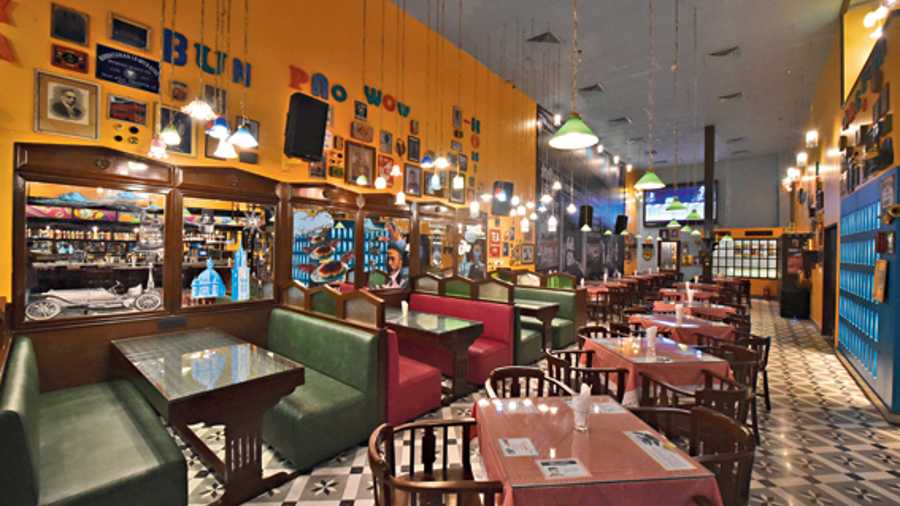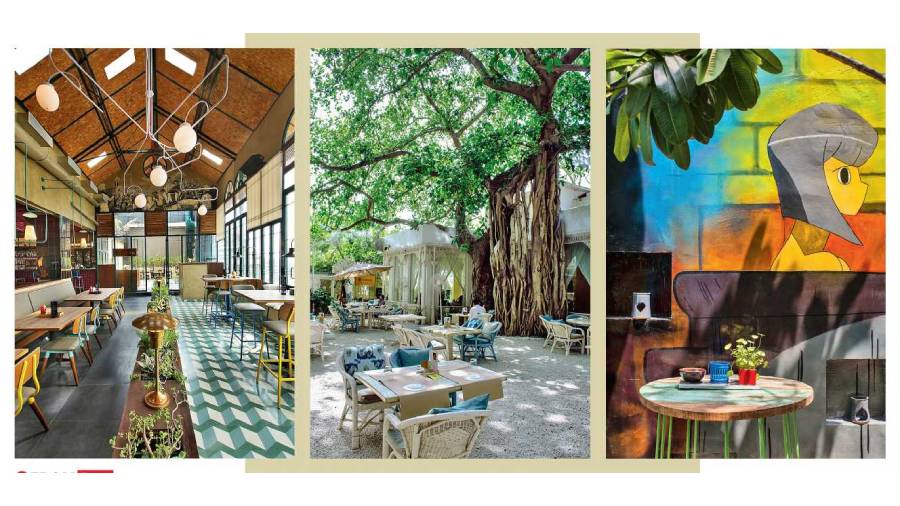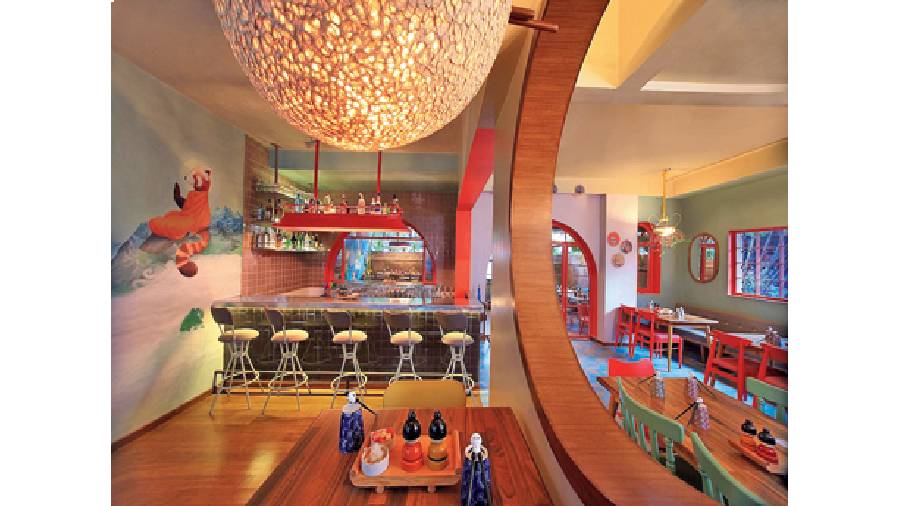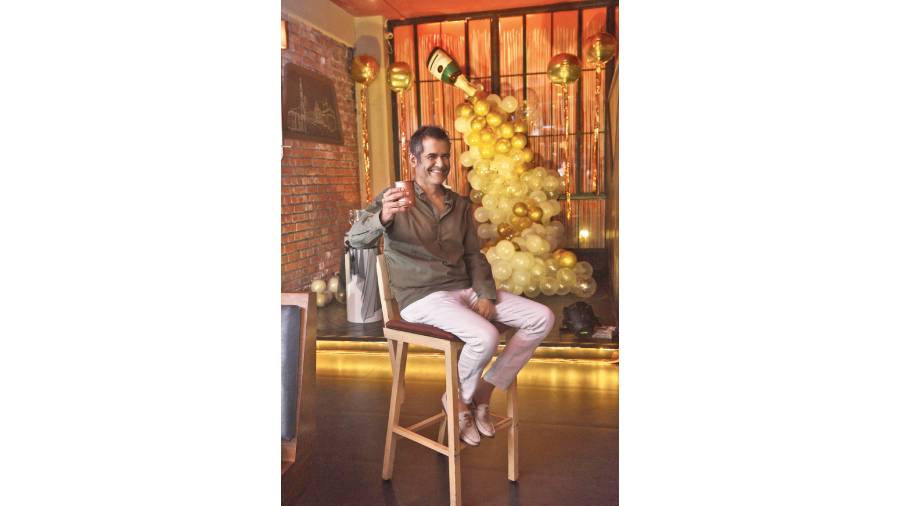If you are scheduled to meet AD Singh, you need to keep a few things in mind — have enough space in your tummy to eat and have a few drinks because he will ensure you are well fed and in high spirits, and you should rest assured of having a great conversation because there is a warmth in his wide smile that is so filterless and pure. In spite of being at the forefront of the Indian hospitality industry for the last 28 years, his humility will amaze you. “In such times in India, where so many people have so little, do try and give back. Whatever your capacity is. Every little bit makes a difference,” said the voracious reader and jazz lover who has launched 14 restaurant brands across the country. On his recent consecutive visits to Calcutta, t2oS caught up with the calm, well-spoken, kind man who is behind many ‘firsts’ in the Indian F&B scene, and he chatted with us about focussing on the Calcutta market, his journey so far and why he has no regrets.
Congratulations on getting SodaBottleOpenerWala (SBOW) to Calcutta! Tell us, how did it work out?
After the success of Monkey Bar, I realised the power of a good F&B brand. So I was looking around. Many years ago there were Irani cafes in Bombay that were opened by one generation but their sons and grandsons were not keen to continue with them. But they (Irani cafes) were very much a part of the culinary landscape of India.
An Irani cafe in Iran and in Paris are very different and here it is very uniquely Indian and it has been a lovely part of growing up for many people. So, with so many cafes closing, there was angst in Bombay and bemoaning the fact and hoping the kids take it forward and carry on the legacy, but it wasn’t happening.
Then I thought it was a lovely story. So, I worked around a while, tried understanding it better and we came up with the first outlet (of SodaBottleOpenerWala) in CyberHub (Gurgaon) in 2013.
Some of the most popular Irani cafes in the country are serving mishmash, so we focused on what the food is going to be and the look and feel. That time we had a very good chef with us. So after a lot of thinking we narrowed it down to what it is today, a mix of Parsi food and Bombay street food, and that’s how we have taken it forward.
Why didn’t you open the first outlet in Bombay?
That’s because the original Irani cafes were there and we were wondering if it will work, will there be negativity or what… I was very pleased to see that in some of the places like Gurgaon and Noida with zero exposure to Irani cafes, people liked the whole experience of it.
Personally, what are the things about Parsi culture and food that interested you? How did you incorporate that in SBOW food?
I am always more about the story and the whole Parsi story is so fascinating and they by far are the most interesting community in the world. The food is delicious, it’s not very exposed, it’s niche, so I thought why not try it. Then we serve Bombay street food that adds so many layers to it.
I am a big egg eater, which is very Parsi, but also a hardcore meat eater. That aside, we had added a couple of dishes from some popular clubs in Bombay like the Eggs Kejriwal, which we added seven years before (Arvind) Kejriwal came to power (laughs) and then an okra dish…. If my mom would have been alive she would have freaked out that I am recommending an okra dish; I used to hate it (laughs) but it’s a great dish.
SOBW has a lot of meat dishes but Chef Irfan has worked hard on developing vegetarian dishes from Parsi and Bombay street food.
There’s the story, the experience and the fun factor about SBOW, but do you feel it will strike a chord with the millennials?
It’s a very good question. It’s also an important question for us that we often talk about. It is true the brand is about a lot of nostalgia and story. Do the millennials connect with it? No. That connect is not there, like the Phateli Coffee on our menu will have no recollection value. But they will connect to the good food and the quirk factor of the place. We also have very fun weekend wali parties, so it’s a buzzy place which they love.
The chefs are doing their best to make the menu interesting and more appealing to the next generation because they are the diners of today and tomorrow.
What is the message you want to get across with SBOW in Calcutta?
That it is a fun place, it appeals to all ages and you can enjoy it in many different ways, or come as a group and have a good time. It’s very friendly for vegetarians and pocket-friendly and I think the fun of the experience cannot be matched actually by any other brand. This is the most fun brand by far.

SodaBottleOpenerWala, Calcutta. Picture: B. Halder
A standalone outlet and an outlet in a mall are quite different. What made you opt for the mall format for SBOW?
South City Mall gets very good footfall regularly day after day. And the food court floor is very popular as people come there to eat. All the places there are doing very well. So that was a good choice for a brand like SodaBottleOpenerWala, which has very delicious food, is well-priced and for everybody kind of thing.
A little birdie told us that you were looking at opening Olive in the city before the pandemic hit. So is there any plan of opening Olive anytime soon?
Calcutta is evolving, it doesn’t have the same numbers as some other cities yet, but it’s growing. We would love to get Olive here, we are looking, but nothing is concrete. We also have other brands like Toast & Tonic, The Grammar Room… we are looking at the market and the brands that would do well here. We are evaluating it for our other brands. That is all I can say right now (smiles).
How happy are you with Monkey Bar, which recently completed five years in the city?
Whenever we open in a new city it’s a question mark and we don’t know how we would do. I mean I have been to Calcutta many times, my brother has studied here, I used to love the khao suey here… I have been here many times, but didn’t know it so well.
So yes, it was a gamble for us as well. But we had a good partner, Avantika (Saraogi) and she has been like family to us now. We opened here because we thought the location was great and when we came in I think the market was just opening up for cool spaces. There has been always good food in Calcutta, but this sort of Westernised place, progressive Indian, a cool bar and our food is outstanding, the energy, music, service… everything is great.
Monkey Bar has been very successful for us here and it has been a pleasure to be here as it has given us a red-carpet welcome to Calcutta. We opened Fatty (Bao) after that.

Monkey Bar, Calcutta; Olive Bar and Kitchen, New Delhi; Guppy, New Delhi
So the Fatty Bao outlet is closed now but it’s operational through online delivery.…
Yes, it’s really working well. It’s creating a buzz over here as well and for us it’s cheaper too. Due to the pandemic we just had to shut two places — Fatty Bao here and Ek Bar in Delhi. Both the places were beautifully done, but yes, it was disheartening to close.
We tried to put a microbrewery in there, we were installed and ready for many many months but the licensing took a long time and then the pandemic hit, which was too much of a loss. So we decided to close the place and use the chef and the team here at Monkey Bar. Since the delivery is doing good, we are now looking around for a standalone space for Fatty Bao.

Fatty Bao, Bandra, Mumbai
What exactly about Calcutta as a market intrigues you?
The first thing we find that there is a very sophisticated audience, mainly the Marwari community, who eat around the world and they have an idea about the brands. It is a growing audience, younger and brighter.
Then there is the Bengali audience who love food a lot and often end up going out three or four times a week to eat. We have seen many of them at Monkey Bar and Fatty Bao. So we have seen that the established audience has always been there who have been curious.
In Calcutta, there are many good old restaurants running successfully and national brands have caught up with the market…. The opportunity has grown well and the level of competition is still not the same as in other cities. So it’s a good time to be in Calcutta. We are looking to bring a couple more brands here.
How do you decide what brand would you get and where?
Brand-wise, we see there is enough of a market who would appreciate that brand, that’s the basic thing. You have to judge that the best you can; do the right market research.
Also, because we are very often progressive and try to be the first, sometimes there is no market research but gut feeling and talking to people like yourself and local partners, and so on. And then we try to see what fits.
For some brands charm is critical, like for Olive, the location is very vital… I believe in a lot a local partner model in cities we are not in because they really help us understand the market, bring the right people in, drag the space.
Last year when the pandemic hit, how much of a struggle was it for a big chain like yours?
Our industry was the worst hit, but our estimation is by the time the pandemic goes away, maybe 25-30 per cent of restaurants will shut permanently. It’s not only disorganised mom-and-pop shops, but even the best companies had to close a lot of places.
Sometimes I laugh when people say to me that we are a big group so it wasn’t hard for us…. But when you have 25 restaurants you have 25 problems! Sometimes I wish I only had one successful restaurant. (Laughs) It would have been much easier.
However, just as you said, mid-summer last year even I didn’t know what to do and it was a stressful time. But then I analysed and realised that my team and I believe in creating great experiences. But after the lockdown, we are glad to see that in the last six months we have managed to cover our losses, that gave us a lot of confidence and, now, after the second lockdown again people are coming out in very large numbers.
If there is a third wave, how equipped are you to deal with it?
The good thing is that since we have faced it last year, we are prepared and know what to expect as our models are in place but at the same time it becomes difficult. The only way we got through the first time is with the support of our landlords, vendors, teams, investors, partners…. Now we have faced a second lockdown but if it goes to third or fourth, the support slows down and makes it harder.
Another good thing is that our state governments, like Maharashtra and Delhi, have been quite proactive. Even now that the state governments of different states are trying really very hard to be sure that the scenario is not back again. So far, the government is doing a great job to see that the third wave doesn’t arrive and in case it does, they are equipped to handle it.
The other thing that is giving me hope is that the number of vaccinations is growing. Herd immunity is growing because everyone is exposed for many months now. I believe Bombay’s herd immunity is estimated to be over 80 per cent.
What would you say is the new normal in the F&B industry?
As a company, we are fairly respectful of the rules, so we are practising social distancing, no big parties… and all that. People need to go out, it’s a part of our lives because we need it. We all work like crazy, so much of stress... going out gives that balance.
What would be your advice to a budding entrepreneur who is getting into the F&B industry right now?
I feel that it’s a good time to get into it because rentals have fallen. You have to understand almost 25 per cent of restaurants have shut down due to the pandemic. Thus, there’s a good opportunity for newcomers to get into the business.
I should also say that they should be careful. They should take protection against any such problems like this in the future… they should discuss the same with their employees regarding a similar situation like this with their staff, landlords, try and take some level of insurance, whatever is possible. Thus, be a bit more prepared.
What are the biggest changes you have seen in this industry since you started? Are you happy with how the F&B industry has grown?
I think I started my career when you were not even born. (Laughs) The industry has grown unimaginably. When I had started, the standalone restaurants were very very limited and it was not an attractive proposition for entrepreneurs to get into. And during my journey, this sector has grown incredibly and now is in great demand as everyone is rushing to be in restaurants.
It’s great for the young consumers, entrepreneurs, workforce. The number of customers in the market has grown and over the last three or four years, the level of exposure has also grown.
So, we are looking for better and better quality, which is super for restaurant groups like ours. We can try and offer different brands, different cuisines, but always have a deep commitment to excellence.
Looking back, is there anything you want to tell yourself from 20 years ago?
(Thinks) This is interesting. I think anybody could look back on life and think there are so many things they could have done better. Very often I get into these conversations with close friends who have lived their lives and where they feel that they needed to change and do things differently, I tell them ‘Be true to yourself.’
You know how grass is greener on the other side? I tell them that they’re doing great. I have never chased money or anything else. I do what I do and I try to do my best. Be fair and good to people. In life, if we chase happiness, everything else will fall into place.
The last thing I would say is that, especially in such times in India, where so many people have so little, do try and give back. Whatever your capacity is. Every little bit makes a difference.
Lastly, is there anything left for you to achieve?
This is an exercise I don’t indulge in because I am very happy where I am, very happy with the way I have led my life, kept my standards and values. So, I don’t waste time thinking what I could have done.
His restaurants according to AD Singh:
SodaBottle-OpenerWala: Delicious, different, fun Indian brand
Monkey Bar: Giving you the prefect place to drink with great grub in a fun setting
Olive: Born out of the core of providing an oasis in our concrete jungles where we can live La Dolce Vita
Fatty Bao: Some of the best Asian food in the country
Guppy: Consistently delicious Japanese food
